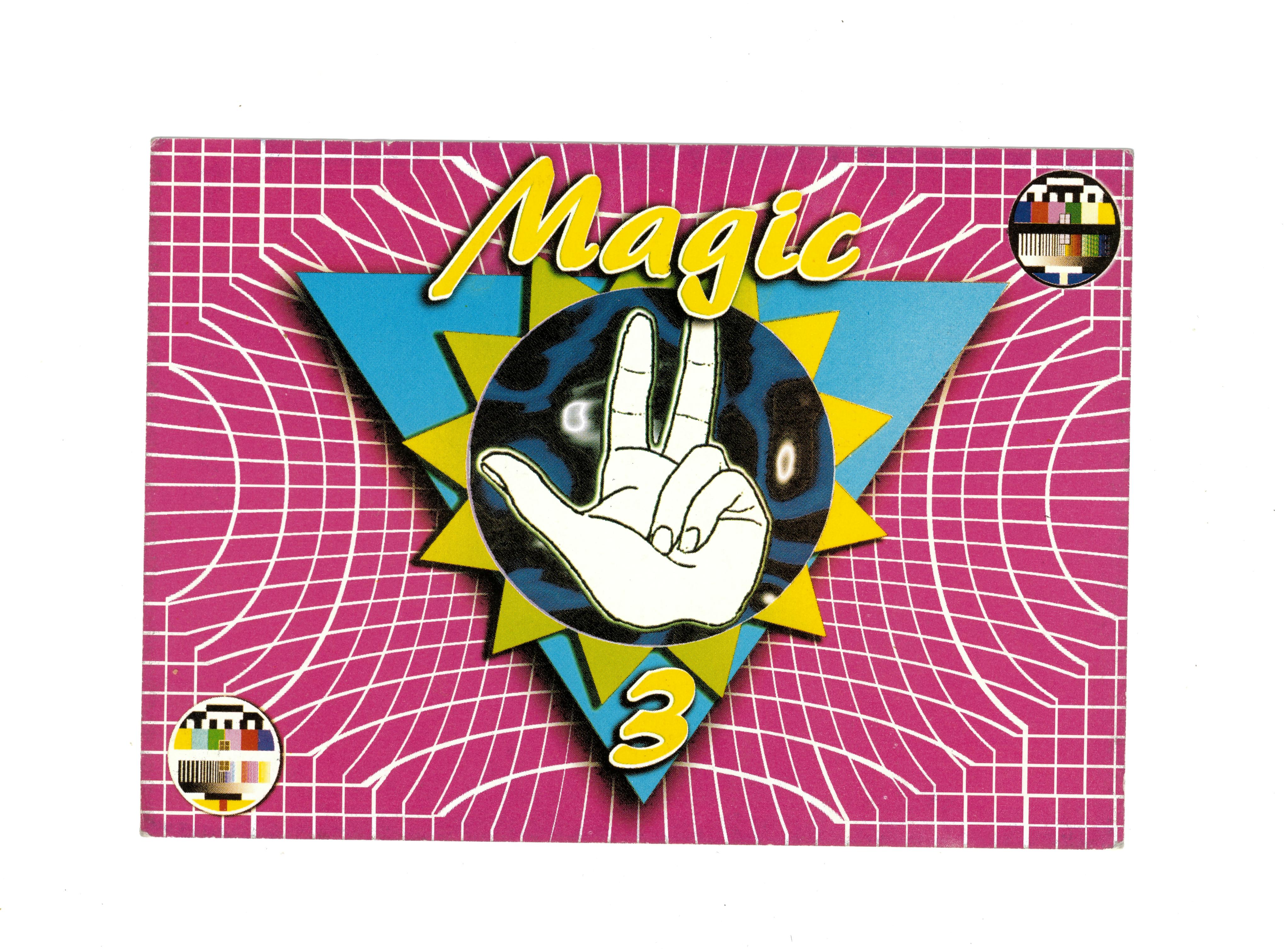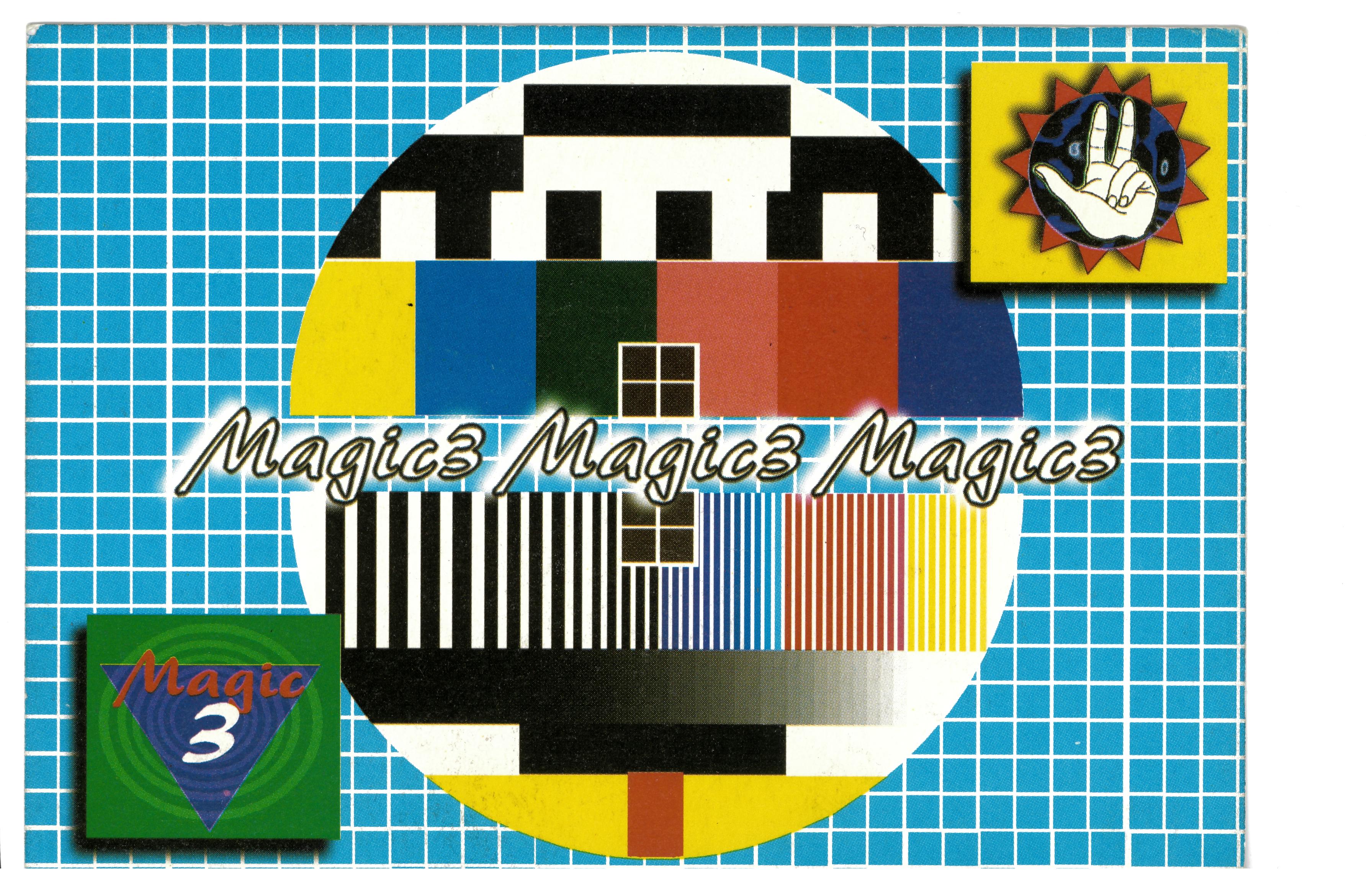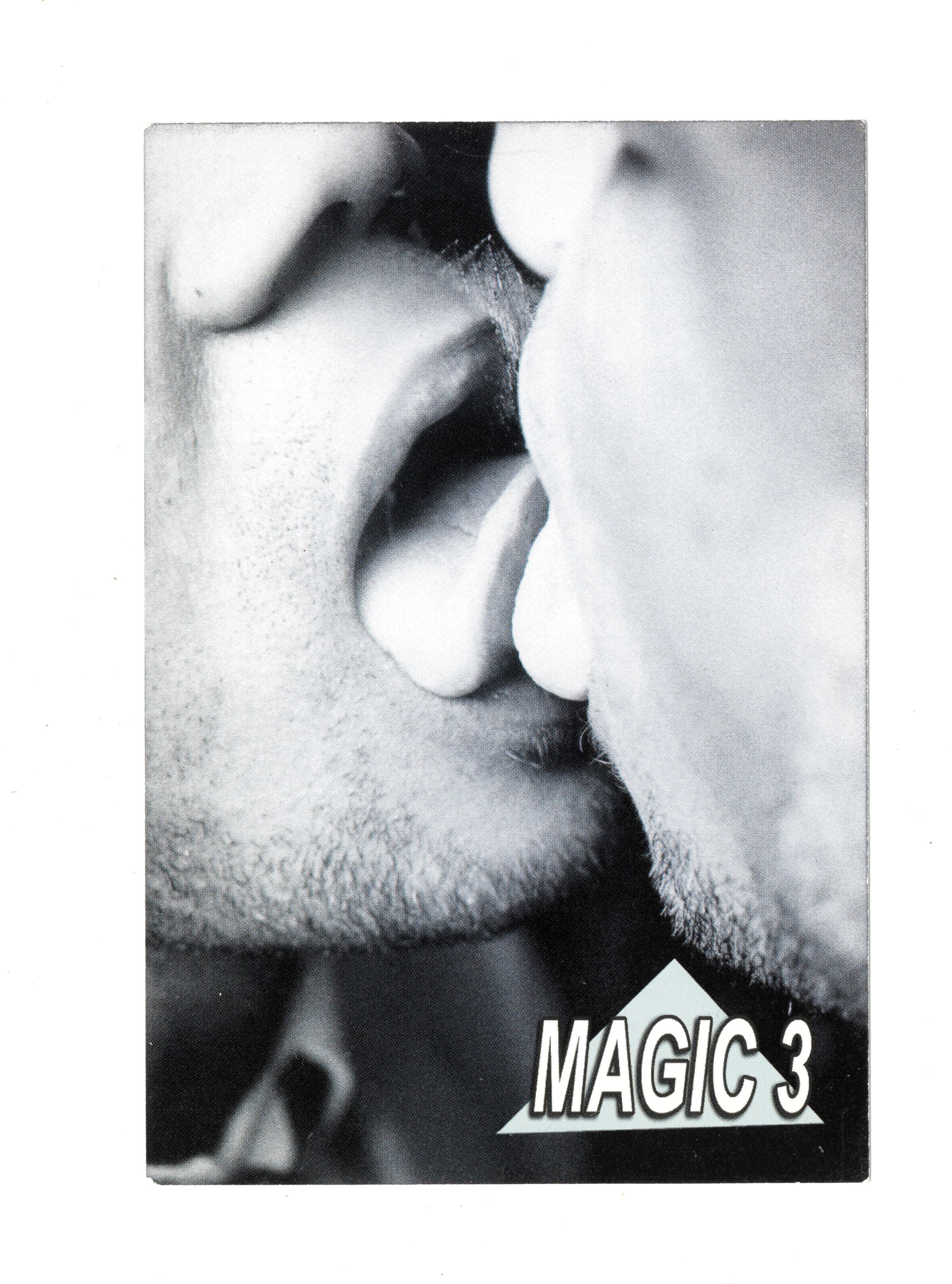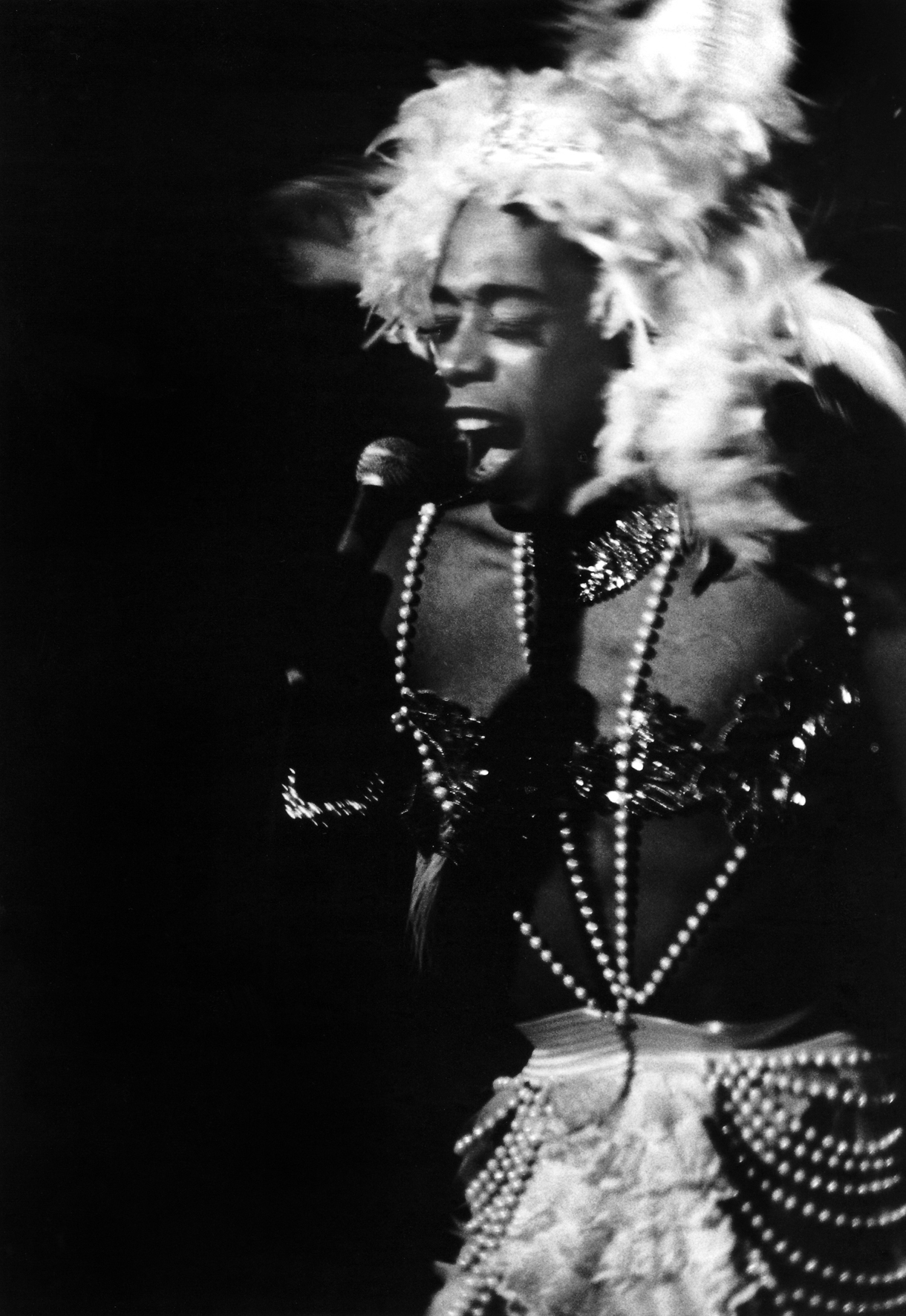Black Cowboys Wearing 👗Dresses
Schwarze Cowboys in Kleidern
Akt 1: Magic 3 and Black Gay Nights at SO36
Akt 1: Magic 3 und Black Gay Nights im SO36
“Black Cowboys wearing dresses” is a sound collage focussing specifically on what was one of the first queer BIPoC events in Berlin nightlife: Magic 3 and Black Gay Nights in the early 90s. Every Tuesday night, dancer Todd Ford and poetry slammer Rik Maverick invited to SO36 with live music, spoken word and dance. Weaving together interview fragments by Todd Ford and Troy Lopez the audio portrait talks about Black-Queer nightlife in Berlin, tells us about queer BIPoC legacies and the importance of listening to histories beyond institutions.
Diese Soundcollage, widmet sich einer der ersten queeren BiPOC-Veranstaltungen im Berliner Nachtleben: die Magic 3 und Black Gay Nights der frühen 90er Jahre. Jeden Dienstagabend luden der Tänzer Todd Ford und der Poetry Slammer Rik Maverick ins SO36 zu Live-Musik, Spoken Word und Tanz. Das Hörbild, das Interviewfragmente von Todd Ford und Troy Lopez miteinander verwebt, spricht über Black-Queeres Nachtleben, erzählt von queerem BIPoC Erbe in Berlin und von der Wichtigkeit, persönliche Geschichten zu erzählen.
Time: 1990-1995
Lat: 52.5003909,
Long: 13.4221612
Published: 08.03.2023
Audio: English
Image: Queen Kenny performing at SO36, 1996 © Nihad Nino Pušija
Directed by/Regie Ly Thien Co Friedrich. Assistant/Assistenz Dilara Gueler. Artist/Künstler Kameron Locke. Sound and Post-production/Sound Ton und Technik Tobias Purfürst
Audio Transkript DE
Troy [00:00:00] Interesse ist, dass man nur eine Person treffen muss. Und wenn du eine Person triffst, wird es zum Schneeball.
Todd [00:00:11] Der erste wirklich schwule Auftritt, der passiert ist.
Troy [00:00:19] Irgendwann kam diese sehr merkwürdige Person auf mich zugestapft und hat entweder die Hand ausgestreckt und gesagt: Hi, ich bin eine Million Meilen pro Minute. Hi, ich bin Rik Maverick, und du weißt, dass du Troy bist. Ich weiß, dass alle darüber reden, dass du in der Stadt bist und so, also ich wollte dich nur willkommen heißen und sagen, dass wir sehr gute Freunde sein werden. Aber genieße den Abend und wir reden später weiter. Und dann war er weg und.
Todd [00:00:35] Rik war ein großer Kerl. Er ist groß und gutaussehend, wirklich nett, sehr intelligent, sanft. Und er liebte es, die Show in den frühen Neunzigern zum Laufen zu bringen. Und so hatten wir eine Menge Geschichten zu erzählen und wir sprachen im Grunde über alles.
Troy [00:01:02] Bist du … ein queerer Raum? Und es gab auch, wie bei allem, was wir später über Berlin herausfinden sollten, immer irgendeine Art von fremdem Element, das daran beteiligt war, es zu verwirklichen.
Todd [00:01:18] Wie ich schon sagte, es war sehr erfolgreich, hoch angesehen in Berlin und sie sagten: Oh, wow, ja, wir gehen hin. Wie fühlst du dich heute Abend? Weil sie in den späten Achtzigern und frühen Neunzigern wirklich einen Namen hatten, und das war im Jahr 92. Im Sommer 92 traf ich einen anderen Afroamerikaner, der im Prenzlauer Berg wohnte. Ich glaube, er war wahrscheinlich auf der anderen Seite. Ich weiß es nicht mehr. Aber ich wette, dass er ein Berliner Player war und er bekam auch eine ständige Förderung, weil sein Zeug so gut war.
Troy [00:01:24] Was interessiert dich wirklich?
Troy [00:01:44] Hatte jemand, der dir einen Raum angeboten hat und gesagt hat, mach was du machen willst.
Todd [00:01:50] Und so haben wir beschlossen, eine Show zusammen zu machen. Und im Grunde war das Black Pearls, was eigentlich der volle Titel war Black Pearls in a Fairly White Clam. Wie ich schon sagte, es war sehr erfolgreich.
Troy [00:02:03] Die Kultur hinter der Musik ist eine noch stärkere Idee.
Todd [00:02:07] Wir hatten Marc, einen jungen afro-deutschen Künstler, gefragt. In unserer Geschichte, Sprechen, Tanz, Musik oder Herz, in Amerika, wo wir herkommen. einige seiner Bilder von den schwarzen Menschen in Berlin auszustellen. Und es war kurz bevor man zeigen musste, dass er von schwarzen Menschen gezeichnet hatte, was wirklich schön und irgendwie. Das war es also, wo du hineingeraten bist? Ich stand auf der Bühne, hatte ein Mikrofon und sagte: "Willkommen im Theater der zerbrochenen Fenster”. Und wie fühlt ihr euch heute Abend? Und das war die einzige Frage, die ich stellte. Und ich ging im Publikum herum und fragte die Leute, und das war der erste Teil der Show. Und dann bin ich wieder auf die Bühne gegangen und habe mich ausgezogen. Ich hatte einen Anzug an, fast wie ein Reporter. Ich zog den Anzug aus und mein Körper war ganz weiß, ganz weiß, und ich schlüpfte langsam in den nächsten Raum.
Troy [00:02:16] Das Leben ist draußen.
Troy [00:02:23] Das Leben ist draußen.
Troy [00:02:41] Es war etwas, das für mich unglaublich war.
Troy [00:03:00] Es ist eine Sache zu sagen, dass du es nicht wusstest, aber wenn du es nicht wusstest, dann gehst du hin und recherchierst, tauchst tief ein, gräbst nach. Dann musst du dich fragen, was dich wirklich interessiert.
Todd [00:03:12] Wenn du sagst Balck Gay Night, dann heißt das nicht, dass viele Schwarze kommen werden. Oh, ja. Vor allem damals, weil genau, die Leute, die die Veranstaltung ins Leben gerufen haben, waren schwarz oder wenn sie es sind oder sie waren nicht verbunden, und die Künstler waren normalerweise schwarz. Meistens war es also eine 80-prozentige... Gruppe. Es gab keine schwarzen Menschen, die schwul waren und mit uns abhingen. Das waren die einzigen Dinge, die passierten und auf die man sich konzentrieren konnte. Queen Kenny Lady Hillary Schwarze Personen mit schwarzen Jugendlichen. Also ja, und es gab einige, die mehr oder weniger eine Gruppe waren, und wir hingen zusammen ab oder tranken Tee oder fuhren Bus. Aber damals hatten wir noch keine Telefone, wir hatten keine Handys. Wir hatten keine, was wirklich schön war. Sponsor. Und so war es wie, Oh, niemand wird kommen und warum solltest du das tun? Und ich hoffe, dass sie wissen, dass solche Sachen einfach so herumliegen. S036 war einer der Zufluchtsorte, über die wir sprachen, was wirklich schön war, weil sie offen für Spontanes waren und es damals wirklich ein anderer Lebensstil war. Ja, genau.
Troy [00:03:36] Interesse ist, dass man nur eine Person treffen muss. Und wenn du eine Person triffst, wird es zum Schneeballsystem.
Troy [00:03:55] Ein Zentrum des Berliner Nachtlebens. So ruhig wie es gehalten wurde, war das SO36. Es war wirklich einer der wenigen Orte, die sich als queerer Raum verstanden und definiert haben, um zu vermitteln, dass die Musik nur ein Teil davon ist. Die Kultur, die hinter der Musik steht, ist sogar noch stärker, damit du wirklich verstehst, dass es sehr wichtig ist, sie aufzunehmen.
Todd [00:04:21] Über unsere Liebe. Und wir haben auch ein bisschen über unsere Geschichte gesprochen, wo wir herkommen und.
Troy [00:04:27] Die Berliner Partywoche begann an einem Mittwochabend. Offiziell gehen alle ins SO und von da an, weißt du, war es etwas, das für mich unglaublich war, zu wissen, dass es Leute gab, die tatsächlich ihr Leben damit verbrachten, auszugehen. Sie gingen am Mittwochabend aus und kamen manchmal erst Tage später nach Hause. Man konnte auch gehen und recherchieren, die Arbeit machen, die.
Todd [00:04:48] Und dann haben wir angefangen über schwarze schwule Pornos zu reden. Nur kurzes Aufblitzen, um die Aufmerksamkeit der Leute zu erregen und dann über Objektivierung nachzudenken. Und jetzt haben wir angefangen, über Objektivierung zu reden, was ein bisschen später ist. Die Leute erinnern sich an einen schwulen Kerl, der, weil wir beschlossen, Magic 3 zu machen, und das war Spoken Word - Live-Musik, wie ich sagte, Rik war, was ich dir sagte, dass er alles tat. Weißt du, er hat ein Flugblatt produziert, ohne mich zu fragen. Und da stand drauf: "Nackt tanzen". die Brüder. Wie ich schon sagte, er war sehr erfolgreich. Er war sehr provokativ, sehr provokant. Und er wollte, dass die Leute reinkommen. Wie ich schon sagte, es war sehr erfolgreich. Und als sie reinkamen und mit etwas konfrontiert wurden, das ein bisschen mehr war als das, was sie dachten: "Oh, Scheiße! Ich meine, wenn man da sitzt und den schwarzen Jesus am Kreuz sieht, ist das schon eine schwarze Perle. Weißt du, da waren eine Menge schwarzer Leute, die sagten: "Oh, und sie dachten, er ist nicht schwarz. Ich meine, das ist wirklich ein schwarzes Auge. Sie fühlten sich zu sehr bloßgestellt. Es fühlte sich zu persönlich an. Sie waren verärgert darüber, dass ich und Rick Informationen über unsere Geschichte, über unsere Gefühle gegenüber, ihr wisst schon, dieser sehr großen Gruppe von Menschen mit schwarzer Hautfarbe mitteilten, was nicht bedeutet, dass viele Schwarze auftauchen. Meistens waren es drei, vor allem in der Nacht. Und weil es nicht so viele waren, weißt du, oder wenn, dann waren sie nicht vernetzt. Also.
Troy [00:05:11] Aber man muss schon wissen, was die Musik aussagt, um das wirklich zu verstehen, und es ist sehr wichtig, dass man sich eine Minute Zeit nimmt, um ein bisschen mehr darüber zu erfahren, was man hier versucht, sich anzueignen.
Troy [00:06:16] Also Ehemann.
Troy [00:06:22] Nicht jetzt. Ich spreche mit deiner Frau.
Troy [00:06:42] Wie ein Freund von mir Berlin als den wilden, wilden Westen bezeichnet hat. Du weißt, dass es im wilden, wilden Westen schwarze Cowboys gab, in diesem wilden, wilden Westen gab es eine Menge schwarzer Cowboys, und einige von ihnen trugen Kleider.
Audio Transcript EN
Troy [00:00:00] Interest is that all you need to do is meet one person. And when you meet one person, it snowballs.
Todd [00:00:11] The first really gay performance event that happened.
Troy [00:00:19] At some point, this very strange person came stomping up to me and either put his hand out and goes hi I'm our at million miles a minute. Hi, I'm Rik Maverick, and you know you're Troy. I know everyone's talking about you being in town and all that, so I just wanted to say welcome and that we're going to be very good friends. But, you know, you just enjoy the evening and, you know, we'll talk later. And then he was gone and.
Todd [00:00:35] Rick was a big guy. He's tall and handsome, really nice, very intelligent, gentle. And he loved to get the show going in the early nineties. And so we had plenty of stories to talk about and we basically talked about.
Troy [00:01:02] Are you … a queer space? And there were also, as with everything that would later come to to to discover about Berlin, there was always some sort of foreign element that was involved in making it happen.
Todd [00:01:18] Like I said, it was very sucessful, highly regarded in Berlin and they were like, Oh, wow, yeah, we're going to go. How do you feel tonight? Because they really had a name in the late eighties and early nineties and that was in 92. Summer 92 was even the and I met this other African American who was living in Prenzlauer Berg. I think he probably was right across. I don't remember. But I bet you he was a Berlin player and he got consistent funding too, because his stuff was so good.
Troy [00:01:24] What are you really interested in?
Troy [00:01:44] Had somebody who was offering you a space and said, do what you want to do.
Todd [00:01:50] And so we decided to make a show together. And basically that was black, Black Pearls, which was really that the full title was Black Pearls in a Fairly White Clam. Like I said, it was very successful.
Troy [00:02:03] The culture behind the music is a even stronger idea.
Todd [00:02:07] We had asked Marc a young Afro-Deutsch artist. In our history, talk, dance, music or heart, in America where we came from. to display some of his pictures of the black people in Berlin. And it was just before you had to show that he had drawn of black people, which was really nice and kind of. So that's what you came into? I was on stage and I had a microphone and I said, Welcome to Theater der zerbrochenen Fenster. And how do you feel tonight? And that was the only question I asked. And I went around in the audience and asked people, and that was the first part of the show. And then I got on back on stage and then I took off. I had a suit on like a reporter almost. I took the suit off and I had my body was chopped white, all white, and slowly slipped into the next room.
Troy [00:02:16] Lives being out.
Troy [00:02:23] Lives being out.
Troy [00:02:41] It was something that was incredible for me.
Troy [00:03:00] It's one thing to say you didn't know, but after you've been introduced to it, if you didn't, then go and, you know, really do your research, do your deep dive, do your digging. Then you have to ask yourself, what are you really interested in?
Todd [00:03:12] If you say black gay night, that doesn't mean a lot of black people are going to show up. Oh, yeah. Especially back then, because exactly, the people who were creating were black or if they are or they weren't connected, and the performers were normally black. So most of the time, you know, it was 80 percent... a group. There were no people of color who would hang out who were gay. Those were the only things that were happening that can focus on. Queen Kenny Lady Hillary Black people with black youth. So yeah, and there were some who were like more or less group and we would, you know, hang out or tea or bus. But back in those days we didn't have phones, we didn't have cell phones. We didn't have, which was really nice. Sponsor. And so it was like, Oh, nobody's going to come and why would you do that? And and hopefully they know though, that kind of stuff would just hang out. S036 was one of the havens we talk about, which was really nice because it was kind of they were open to spontaneous and it was really a different lifestyle back then. Yeah.
Troy [00:03:36] Interest is that all you need to do is meet one person. And when you meet one person, it snowballs.
Troy [00:03:55] A hub of Berlin nightlife. Quietly as it was kept, SO36 was. It was really one of the few places who associate and defined itself by being a queer space to educate that the music is just a part of it. The culture behind the music is even stronger for you to really understand that it's very important to take.
Todd [00:04:21] About our love. And we also talked a little bit about our history of where we came from and.
Troy [00:04:27] The Berlin Party Week started started on a Wednesday night. Officially, everyone go into SO and then from there, you know, it was it was something that was incredible for me to know that there were people who actually spent their lives being out. They were they would go out on the Wednesday evening and, you know, some sometimes days later, they would they would come home. You could also go and do the research, do the work that.
Todd [00:04:48] And and then we started talking about black gay porn. Just flashing for a minute to just get people's attention and then think about objectification. And now we started talking about objectification, which is a bit later. People recall a gay guy who did because we decided to do Magic 3, and that was spoken word live music, like I said, Rik was which was I told you that he did anything. You know, he produced one flyer without asking me. And it said dancing naked on it. the brothers. Like I said, it was very successful. He was very provocative, very provocative. And he wanted to people to come in. Like I said, it was very successfull. And when they came in and they were confronted with something a bit more than they, you know, had to like, think like, oh, shit. Like, I mean, just sitting there looking at the Black Jesus on cross, it's like that's already a black pearl. You know, there were a lot of people over there in the black, you know, say, Oh, and they felt he's not black. I mean, this is really a black eye. They felt too exposed. It felt too personal. They were upset that I was sharing and Rick was sharing information about our history, about our feelings about, you know, to this very large population of if you say black, gay night, that doesn't mean a lot of black people show up. There was three like most of the time, especially. And because there weren't that many, you know, or if they were, they weren't connected. So.
Troy [00:05:11] But you kind of have to know what what the music is channeling for you to really understand, and that it's very important to take a minute to get to know a bit more about what it is you're trying to appropriate here.
Troy [00:06:16] So husband.
Troy [00:06:22] Not now. I'm talking to your wife.
Troy [00:06:42] As a friend of mine used to refer to Berlin as the wild, wild West. You realize that as there were black cowboys in the wild, wild West, in this wild, wild West, there were a lot of black cowboys, and some of them wore dresses.
Material
In cooperation with Traces of Resistance
Figures and Voices
Todd Ford is a dancer, videographer, photographer one of the co-organiser of Magic 3 at SO36.
Rik Maverick was spoken word artist and one of the co-organiser of Magic 3 at SO36.
Queen Kenny was a berlin-wide known drag-performer and importatn queer figure for the berlin black gay scene. He was co-organizer of Black Gay Night.
Troy Lopez is a cook and co-founder of RosaCaleta a jamaican/european restaurant in Berlin.
Traces of resistance team:
Litchi Ly Friedrich is an interdisciplinary artist, expressing herself especially through dance and performance. She positions herself as an intersectional feminist. Her work is strongly shaped by the Ballroom community, diasporic experiences and dissect the issues surrounding identity, and the various societal and structural factors that shape, especially the experiences of the diaspora. She is a member of the Ballroom House of Saint Laurent.
Performer:
Kameron Locke is a classically trained singer, musician and interdisciplinary performer from Chicago based in Berlin. His works and collaborations are rooted in African diasporic discourses and decolonial strategies in the sonic field. He worked internationally with high-profile institutions such as London Symphony Chorus, Chicago College of Performing Arts, Gropius Bau, Savvy Contemporary etc.
Orgs focused on the rights, equality, and support of trans folks
A thorough list of global LGBTQ orgs
All Out – global not-profit focused on political advocacy for the human rights of TLGBQIA+ communities. @weareallout
Astraea Lesbian Foundation For Justice – working exclusively to advance TLGBQIA+ human rights around the globe. @astraeafndtn
Global Action for Trans Equality (GATE) – international advocacy organization working toward justice and equality for TGNBI communities. @gateorg
Global Equality Caucus – international network of parliamentarians and elected representatives aiming to tackle discrimination against TLGBQIA+ people. @equality_caucus
Human Dignity Trust – UK-based organization that focuses on strategic litigation challenging the criminalization of TLGBQIA+ people globally. @humandignitytrust
International Lesbian, Gay, Bisexual, Trans and Intersex Association (ILGA) - Worldwide federation of more than 1,700 organisations from over 160 countries and territories campaigning for lesbian, gay, bisexual, trans and intersex human rights. @ilgaworld
International LGBTQI Youth & Student Organisation (IGLYO) - World's largest network for LGBTQI young people & students. Work focuses on the protection, empowerment, and freedom of LGBTQI young people between 18-30 years old. @iglyo
Kaleidoscope Trust– non-profit that campaigns for the human rights of TLGBQIA+ people in countries where they are discriminated. @kaleidoscope_t
(link: https://www.mamacash.org/ text: Mama Cash target: _blank – supports women, girls, trans people, and intersex people who fight for their rights. @mamacashfund
Open Society Foundations – seeks to combat discrimination by empowering TLGBQIA+ communities to promote and defend their human rights. @opensocietyfoundations
OutRight Action International (OutRight) – human rights NGO that addresses human rights violations and abuses against TLGBQIA+ people. @outrightintl
StrandsForTrans.com – Strands For Trans maps trans-friendly barbershops and salons in the US, Canada, Mexico, the UK, Netherlands, Czechia, Finland & Australia. @strandsfortrans
United Nations Free & Equal – operates as a global public education campaign for TLGBQIA+ equality everywhere. @free.equal
WPATH.org – World Professional Association for Transgender Health.





